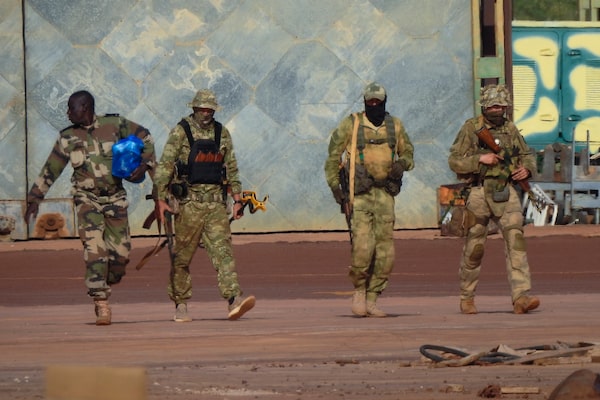
Three Russian mercenaries, right, in northern Mali.The Associated Press
Russian mercenaries have been involved in the torture and killing of civilians in the Central African Republic over the past three years, witnesses have told a human-rights group.
The witnesses described how Russian contractors killed at least 12 unarmed men at a roadblock last year, according to a report on Tuesday by Human Rights Watch (HRW). They also recounted how Russian mercenaries unlawfully detained and tortured civilians in several other incidents in recent years.
The HRW report’s findings are the latest evidence of atrocities by Wagner Group, a Kremlin-connected private military contractor with growing operations in several African countries. In another recent case, Wagner Group was reportedly implicated in the massacre of 300 to 500 civilians in a village in central Mali in late March.
Analysts say the Russian military contractor is increasingly active in Africa, helping Moscow to expand its political influence and gain access to government revenue and natural resources.
Mali’s military junta announced on Monday that it is terminating its defence agreements with France. The announcement is a victory for Wagner Group, whose soldiers have replaced French troops in several bases in Mali after being recruited by the junta in December.
Mali’s military junta blocks UN investigation of alleged massacre by Malian and Russian forces
The Russian mercenaries seem to operate with impunity, human-rights activists say, since there is no indication that any Wagner Group personnel have been prosecuted for the alleged atrocities in Mali and Central African Republic. The Russian company is also active in Sudan and Libya, and was previously active in Mozambique.
“Russian forces in Africa now control and operate naval bases, airfields, military camps, an array of weapons systems and natural resource stakes including gold, diamond and other mines,” said a commentary this week by two analysts, Jalel Harchaoui and John Lechner.
“Such assets were acquired partly in response to the sanctions that Washington imposed in retaliation to the 2014 annexation of Crimea, and their utility to Moscow has only increased as a result of this year’s Ukraine crisis.”
Under an agreement in 2018 between Russian authorities and the Central African Republic, the Russians were to provide training to Central African forces, who have struggled to fend off rebel attacks and protect the country’s fragile government.
But the Russians quickly gained huge influence over military operations in the country. By last year, according to the European Union, most Central African army units were operating under the “direct command or supervision” of Wagner Group mercenaries.
HRW said it documented the Russian killings and abuses by interviewing 40 people, including 15 witnesses and 10 victims.
The Wagner Group soldiers do not wear any official uniform or insignia. But witnesses identified them because they were Russian-speaking white men who carried military-grade weapons, wore beige khaki clothes and military boots, and covered their faces with scarves and sunglasses.
In the roadblock killings, HRW said it interviewed 12 people who described the deaths of civilians near the town of Bossangoa last July. They said the Russians “set up a roadblock, stopped the men, beat, and shot them dead, and then put at least eight of the bodies in a shallow hole next to the road.” Some of the victims were men on motorcycles who were forced to kneel and were then shot in the head, the report said.
In separate incidents, witnesses told HRW that Russian troops were involved in detaining and beating or torturing civilians in 2019 and 2021. One detainee said the Russians accused him of belonging to a rebel group and then tortured him by cutting off one of his fingers, tightening a chain around his neck, and placing a brick in his mouth and kicking it.
Similar allegations have been made by a United Nations panel of experts, alleging that “Russian private military and security personnel” in the Central African Republic have been involved in extrajudicial killings, enforced disappearances and torture. The UN experts said they had received “numerous reports” of indiscriminate killings of unarmed civilians by “Russian instructors.”
Ida Sawyer, crisis and conflict director at HRW, said the Russian-identified forces seemed to be operating with complete impunity.
“The failure of the Central African Republic government and its partners to forcefully denounce their abuses, and to identify and prosecute those responsible, will most likely only fuel further crimes in Africa and beyond,” Ms. Sawyer said in a statement on Tuesday.
“The Central African government has every right to request international security assistance, but it can’t allow foreign forces to kill and otherwise abuse civilians with impunity.”
A report in March, published by the Foreign Policy Research Institute (FPRI), said the Wagner Group developed tactics in Sudan and Central African Republic that it later used in Mali. In each case, it responded to African governments that wanted security assistance. Its activities have included “disinformation and pro-government information warfare strategies, including fake polls and counter-demonstration techniques,” the report said.
In the future, the FPRI report said, the Russian mercenary group could expand its influence to other African countries, with Burkina Faso a possible next target.
Our Morning Update and Evening Update newsletters are written by Globe editors, giving you a concise summary of the day’s most important headlines. Sign up today.
 Geoffrey York
Geoffrey York